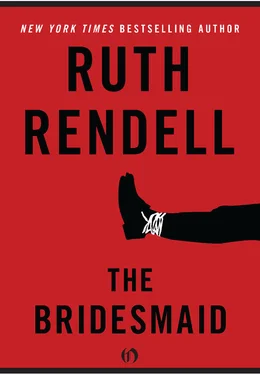Ruth Rendell - The Bridesmaid
Здесь есть возможность читать онлайн «Ruth Rendell - The Bridesmaid» весь текст электронной книги совершенно бесплатно (целиком полную версию без сокращений). В некоторых случаях можно слушать аудио, скачать через торрент в формате fb2 и присутствует краткое содержание. Год выпуска: 2010, Издательство: Open Road Integrated Media LLC, Жанр: Триллер, на английском языке. Описание произведения, (предисловие) а так же отзывы посетителей доступны на портале библиотеки ЛибКат.
- Название:The Bridesmaid
- Автор:
- Издательство:Open Road Integrated Media LLC
- Жанр:
- Год:2010
- ISBN:нет данных
- Рейтинг книги:3 / 5. Голосов: 1
-
Избранное:Добавить в избранное
- Отзывы:
-
Ваша оценка:
- 60
- 1
- 2
- 3
- 4
- 5
The Bridesmaid: краткое содержание, описание и аннотация
Предлагаем к чтению аннотацию, описание, краткое содержание или предисловие (зависит от того, что написал сам автор книги «The Bridesmaid»). Если вы не нашли необходимую информацию о книге — напишите в комментариях, мы постараемся отыскать её.
The Bridesmaid — читать онлайн бесплатно полную книгу (весь текст) целиком
Ниже представлен текст книги, разбитый по страницам. Система сохранения места последней прочитанной страницы, позволяет с удобством читать онлайн бесплатно книгу «The Bridesmaid», без необходимости каждый раз заново искать на чём Вы остановились. Поставьте закладку, и сможете в любой момент перейти на страницу, на которой закончили чтение.
Интервал:
Закладка:
Am I then conniving at murder? Am I covering murder up? What good would it do to bring Myerson’s killer to justice? Would it bring poor Myerson back? One of the reasons for apprehending a killer was to prevent such a person from killing again. He already knew that she had killed before. She had told him so obliquely enough, but she had told him. That had been the first use of a glass dagger.
The house in Tarsus Street lay in darkness. The shutters at the basement window were folded back, but there was no light on inside. As he let himself into the hall, he remembered the time when she had excluded him and his subsequent passion of unhappiness. How could he have felt like that then, so short a time ago, and feel like this now? If he hadn’t told her that lie about killing John Crucifer, perhaps Myerson would still be alive. And he had told the lie solely to get back someone he no longer wanted.
He walked down the stairs with a slow, heavy tread. He switched off the light and, in the darkness, let himself into the dark room. There was absolute silence, but as he came near the bed, he heard her sigh in her sleep. The way she was breathing and the depth of her sleep told him she had taken one of Rita’s pills. Otherwise, at his approach, she would have woken. He took off his clothes and lay down beside her. It seemed the only thing to be done. For a long while, before sleep came, he lay there looking at the pale curve of her cheek against the brown cotton pillow. Strands of silver hair caught what light there was and gleamed in the dimness. She lay on her side with her little hands curled into fists and held under her chin. He lay apart from her for a while, and then, tentatively, like a shy person who fears rejection, he laid his hand on her waist and drew her to him in the curve of his arm.
They were in her room and it was morning, early still, only a little after seven but broad brilliant daylight. The sun poured with rich abandon onto the shabbiness, the decay, through windowpanes filmed with dirt. Philip had made coffee. There was some milk left in a bottle but it had turned sour. Senta had wrapped herself in a couple of shawls, one tied around her waist, the other over her shoulders. The roots of her hair were showing red again. She was still in a sleeping-pill trance, swimmy eyed, her movements slow, but he could tell she already sensed the change in him. She was cowed by it and afraid. He sat at the foot of the bed and she at the head of it, leaning on the pillows. But now she crept towards him across the hillocks of the quilt and put out her hand timidly to take his. He felt like snatching his hand away but he didn’t. He let it lie in hers, feeling a constriction in his throat.
To his own ears he sounded as if he had a bad cold. He tried to clear his throat. “Senta,” he said, “did you kill him with the second of the glass daggers?”
The question was so bizarre, the words themselves and their conjunction, as well as the fact that he had actually seriously uttered them to someone he was supposed to love, to contemplate marrying, that he squeezed his eyes shut and pressed his fingers to his temples.
She was nodding her head. He knew what was going on in her mind. To his questions, to the facts and the danger, she was indifferent. She only wanted him to go on loving her. He said, trying to keep his voice steady and to remain cool, “Then, don’t you realise, the police will find you. It’s a wonder they haven’t by now. The glass daggers link the two deaths. Eventually, they’ll find that link. They must have those details somewhere on their computer—why haven’t they come to you?”
She looked at him and smiled. His hand was tightly enclosed by hers, so she could smile. “I want you to be jealous, Philip. I know it’s not kind of me, but I do like it when you’re jealous.”
Her interpretation of his questions made him see something new—that she was sliding away from normalcy. What hold she had on reality was loosening.
“I’m not jealous,” he said, trying to keep his patience. “I know this Martin wasn’t important to you. I’m worried for you, Senta, I’m worried about what’s going to happen.”
“I love you,” she said, and she held his hand in both hers, kneading it painfully. “I love you better than I love me, so why should I care what becomes of me?”
Strangely, horrifyingly, he knew it was true. She loved him like that and her face told him so. The words were unnecessary. He held her close to him in the bright, dust-filled, indifferent sunlight, pressed his hands on her back and his cheek against hers, his nerves unfeeling, his body restless to be gone. She nestled close to him and time passed, long moments that felt like hours until at last he had to say.
“I’ve got to go, Senta.”
She clung more closely. “I can’t take more time off,” he said. “I’ve got to go to work now.”
He didn’t tell her that first of all he was going to see Fee and Darren, to catch them before they left for work. He had to prise her off him, kissing her for comfort. The shawls spread over her, she curled foetuslike into the brown bedclothes. To exclude the harsh yellow light, he pulled the shutters nearly closed and left the room quickly without looking back at her.
His brother-in-law presented a different and more attractive image at breakfast time than in those afternoon and evening hours when he was to be found sprawled in front of the screen. Newly shaven, he was the handsome bridegroom once again, a frown of concentration aging him as he studied, of all unlikely newspapers, the Financial Times . And Fee who had been bright and brisk, a hair dryer in one hand and a plate of toast in the other, was astonished to see her brother, convinced he must have come because of some accident that had happened to their mother. Telling her everything was all right, Philip wondered at the use of this phrase which must always be meaningless.
He found himself postponing discussion of the true reason for his visit. Perhaps people often did that, he thought. Speak of the lesser anxiety first, the smaller care. Yet to place Cheryl in this category brought a rush of guilt. Fee was incredulous, then embarrassed. She lit a cigarette as if it was anything but addiction they were discussing.
“Fruit machines?” said Darren. “ Fruit machines? I play fruit machines but no one calls me a junkie.”
“You’re not addicted to them. You can control your need to play them and you can make yourself stop. Cheryl can’t.”
Philip could tell that he was getting nowhere with these two, who would have perfectly understood the perils, for instance, of alcoholism. It showed him how far Fee had grown away from him and how much nearer to Darren. Perhaps it was necessary and inevitable for the endurance of the marriage. The time had come and could be put off no longer. Darren had already got up from the table and was hunting for his car keys. Philip said, “Who’s Martin Hunt?”
“What?”
“Martin Hunt, Fee. I’m sure it’s through you and Darren I’ve heard the name.”
She frowned, screwed up her nose at him in indignation or incredulity. “You know who it is, you must know. What’s wrong with your memory these days?”
“Is he—is he dead?”
“How should I know? I shouldn’t think so. He’s young. He’s only twenty-four or twenty-five. Why would he be dead?”
“Who is he, Fee?”
“I don’t know him,” she said. “It was Rebecca I knew. Rebecca Neave that I was at school with. He was her boy friend. That’s all I know, what I saw on telly and in the papers.”
It took him a little while to digest this, to understand the meaning of what she had said and to draw inferences. He wondered later if she had noticed how he had turned pale. He felt the blood drawn from his face and a goose-pimpling. It was something like faintness too. He held on to the back of one of Fee’s dining chairs. Darren came up to Fee and said he was off and kissed her.
Читать дальшеИнтервал:
Закладка:
Похожие книги на «The Bridesmaid»
Представляем Вашему вниманию похожие книги на «The Bridesmaid» списком для выбора. Мы отобрали схожую по названию и смыслу литературу в надежде предоставить читателям больше вариантов отыскать новые, интересные, ещё непрочитанные произведения.
Обсуждение, отзывы о книге «The Bridesmaid» и просто собственные мнения читателей. Оставьте ваши комментарии, напишите, что Вы думаете о произведении, его смысле или главных героях. Укажите что конкретно понравилось, а что нет, и почему Вы так считаете.











